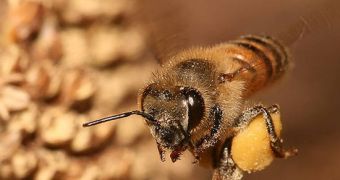According to the latest statistics provided by the British Beekeepers' Association (BBKA), it would appear that one in five UK bees died over the past winter. While the number may seem manageable, the association draws attention to the fact that more than 30 percent of the total stock was lost the year before, which brings the total number to about 50 percent of all colonies in the country. At this point, beekeepers say, they are struggling to keep their hives alive, though little hope is in sight.
The BBC News informs that bees in the UK are worth more than £200 million (roughly $330 million), mostly through their contribution to pollinating crops. They are also an important part of the ecosystem, and, if they disappear, the consequences could be disastrous, experts say. At this point, there are several factors that contribute to the bees' demise, including a parasitic mite, which scientists seem unable to remove from the insects, a number of viruses, and shifts in seasonal temperatures.
The official numbers released by the BBKA show that 19.2 percent of all colonies died during the 2008/2009 winter season, which is more than twice the number recorded in an average winter. The losses were highest in the northern parts of the country, where as much as 31 percent of stocks were lost. In eastern regions, the levels were as low as 12.8 percent.
The new investigation “underlines the need for research into the causes and remedies for disease in order to ensure that our principal economic pollinator, the honeybee, can survive the onslaught of the threats it currently faces. These ongoing losses in the pollination army of honeybees cannot continue if we are to secure food supplies,” Tim Lovett, the president of the BBKA, warns. He believes that there still exists a “worrying and continuing high level of colony loss” in the country.
“We want urban people to engage with wildlife and get joy and pleasure from it. The more hives you have the more resilient the whole population is to the outbreak of [the] disease,” Tom Tew, the chief scientist of conservation watchdog Natural England, has urged in a recent interview with the news outlet.

 14 DAY TRIAL //
14 DAY TRIAL //